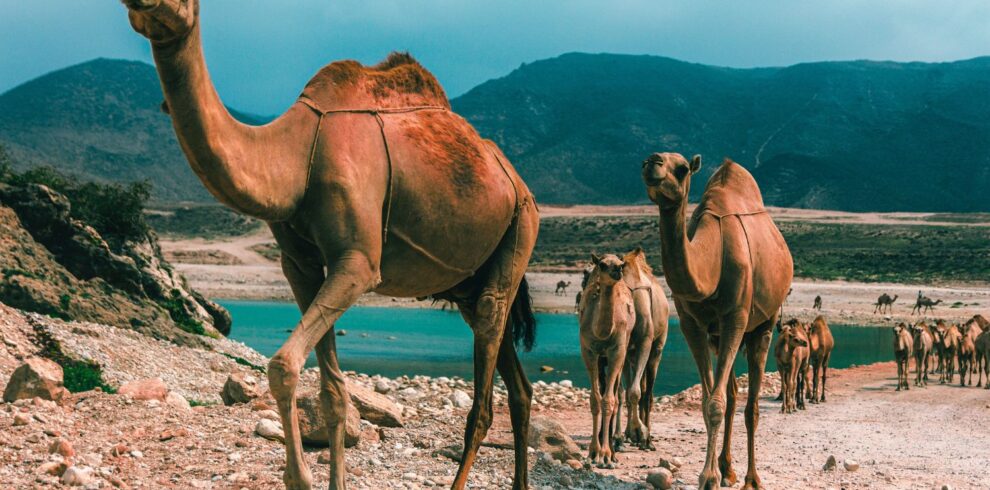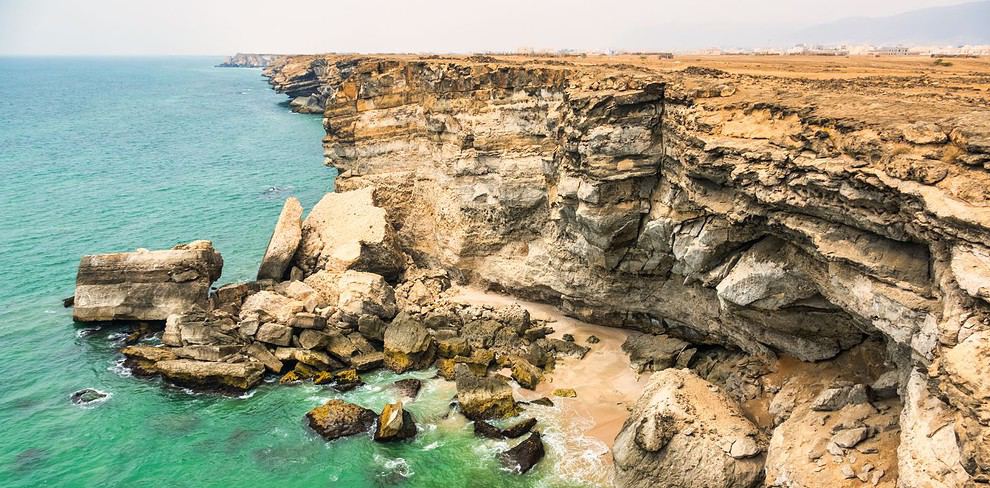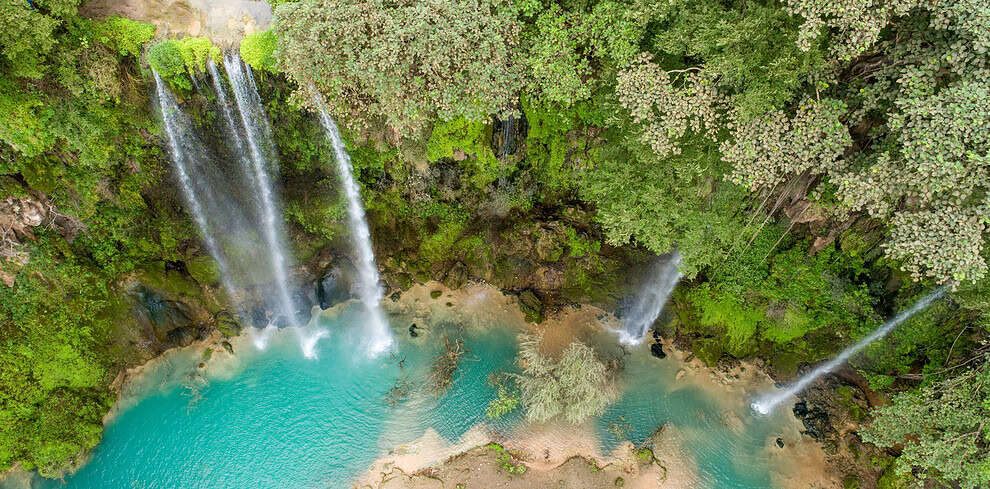Table of Contents
Dive into Oman culture as we provide you with an in-depth understanding of the customs of Oman, and its diverse and vibrant heritage, encompassing traditions, values, and unique customs and practices.
Omanis place a strong emphasis on hospitality, welcoming guests with open arms. Family is at the core of Omani society, with strong bonds and a sense of community. It’s important to recognize that Omani culture is continually evolving, influenced by historical events, regional dynamics, and global interactions.
Understanding the culture of Oman can provide valuable insights into the complex and diverse society of the country.
Oman Culture
Here are the most important points to begin learning about Oman culture and customs:
- Ethnic Diversity: Oman is home to a diverse mix of ethnic groups, each with its own customs and traditions. Omanis, Dhofaris, Baluchis, and Zanzibaris are some of the major ethnic communities.
- Languages: The official language is Arabic, but numerous regional languages and dialects are spoken throughout the country.
- Islamic Practices: Oman is predominantly a Muslim country, and Islam is deeply ingrained in Oman culture, affecting daily life, values, and societal norms. This includes daily prayers, fasting during Ramadan, and adherence to Islamic dietary laws. The majority of Omanis practice Ibadi Islam, with a minority following Sunni or Shia Islam.
- Greeting Etiquette: Greetings are an essential part of Oman culture. Handshakes are common between men, while men and women usually do not shake hands. Instead, they greet each other verbally with polite phrases.
- Traditional Clothing: Traditional Omani clothing, such as the “dishdasha” for men and “abaya” for women, is commonly worn. Traditional attire varies by region and ethnicity but remains an integral part of Omani identity.
- Cuisine: Omani cuisine features dishes like “shuwa,” rice dishes, and a variety of seafood. It reflects a fusion of Arabian, Indian, and Persian flavors.
- Hospitality: Omanis are renowned for their warm hospitality. When guests visit, they are offered coffee, dates, and often a place to stay. It is considered impolite to decline such offers.
- Respect for Elders: Respect for elders is a deeply ingrained custom. Younger individuals show deference to their seniors through words and actions.
- Arts and Crafts: Oman has a rich tradition of arts and crafts, including intricate silverwork, pottery, and weaving.
- Music and Dance: Traditional Omani music includes instruments like the “oud” and “rebaba.” Folk dances are an integral part of cultural celebrations.
- Celebration of Festivals: Omanis celebrate various religious and cultural festivals, such as Eid al-Fitr, Eid al-Adha, and the National Day. These celebrations often involve special prayers, feasts, and gatherings with family and friends.
- Family and Community: Family is central to Omani society, and strong community bonds are essential for support and social cohesion.
- Gender Roles: Gender roles are traditionally defined, with men and women often occupying distinct social spheres. However, changes are occurring, particularly in urban areas.
- Marriage Customs: Arranged marriages are a prevalent custom in Oman. Families play a central role in matchmaking, and the union is seen as a commitment not only between individuals but also between families.
- History and Heritage: Oman’s history, including its maritime traditions and ancient forts, has had a significant impact on its culture and identity.
These customs are essential aspects of Oman culture and are readily visible in everyday life, reflecting the country’s rich cultural heritage and strong sense of community and tradition.
Oman Traditional Attire
Oman traditional attire is a reflection of the country’s cultural heritage, regional distinctions, and historical influences. Omani clothing serves both functional and cultural purposes, representing the nation’s identity and traditions.
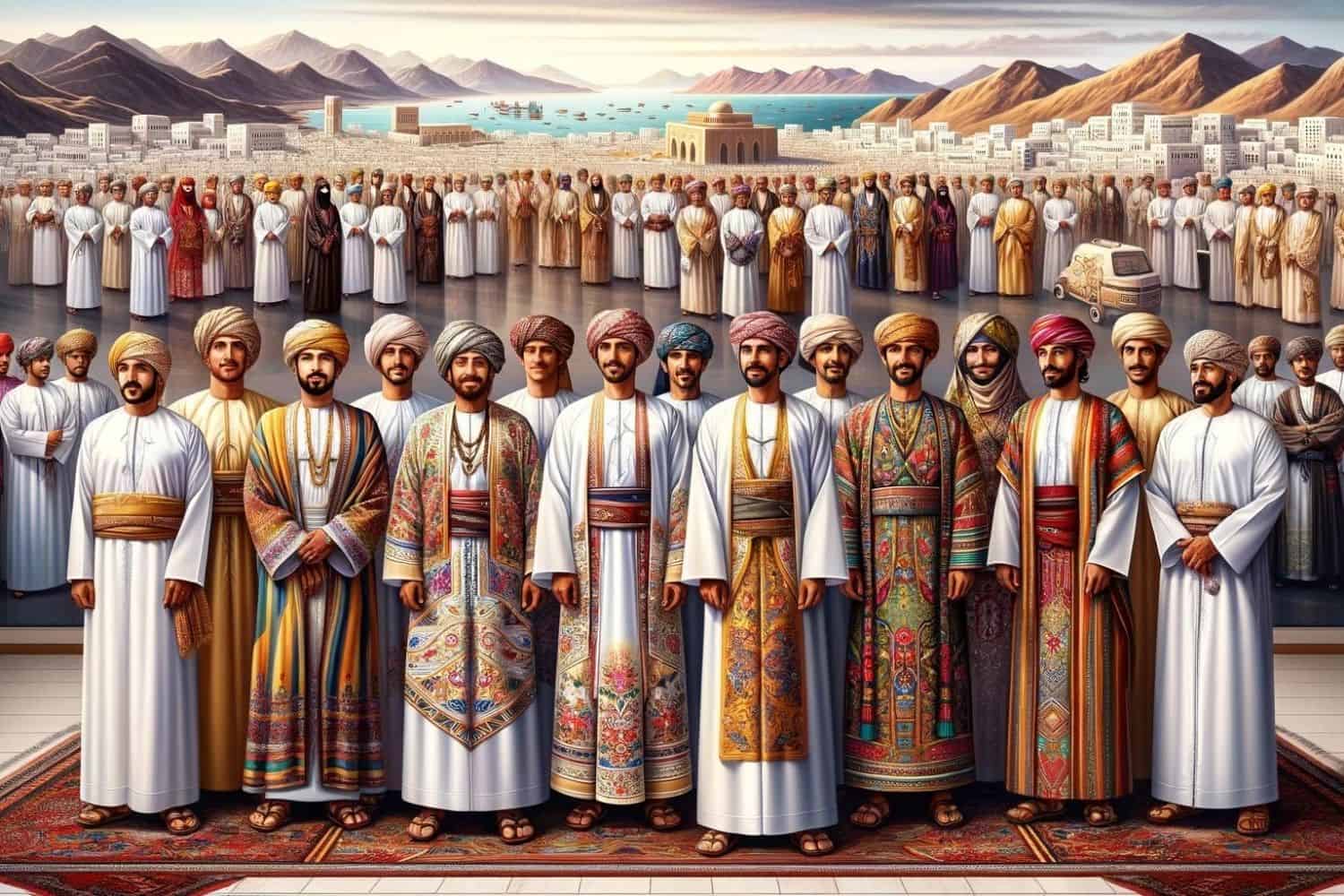
1. Regional Variation: Oman’s traditional clothing varies from region to region due to differences in climate and lifestyle. In the coastal areas and the hot desert, people tend to wear lighter and more breathable garments, while in the cooler mountainous regions, heavier clothing is preferred.
2. Dishdasha: The dishdasha is the traditional Omani attire for men. It is a long, loose-fitting robe that is typically white or off-white, ideal for keeping cool in the desert heat. Men often pair the dishdasha with a kumma (cap) and sandals.
3. Abaya: The abaya is the traditional attire for Omani women. It is a long, flowing black cloak that covers the entire body. Women often wear a headscarf or hijab along with the abaya.
4. Musar: Omani men often wear a musar, which is a traditional turban-like head covering. The musar is wrapped in a distinctive style, and the color and design can indicate the wearer’s tribe or social status.
5. Modesty and Cultural Significance: Traditional Omani attire, whether for men or women, emphasizes modesty and covers the body. The choice of colors and fabrics can hold cultural and regional significance, and attire may also convey social or marital status.
6. Special Occasion Attire: Omanis dress elegantly for special occasions and celebrations, such as weddings and religious events. Traditional clothing for these events may include intricate embroidery, embellishments, and jewelry to enhance the overall appearance.
7. Adaptation to Modernity: While traditional attire remains essential for cultural events and formal occasions, Omanis have incorporated Western clothing into their daily lives, especially in urban areas. It reflects the influence of modernization and global fashion trends.
Oman traditional attire represents more than just clothing; it embodies the nation’s cultural diversity, history, and identity. The garments tell a story of Oman’s rich traditions and the enduring connection between its people and their heritage.
Oman Marriage Traditions
Oman Marriage Traditions are deeply influenced by the country’s cultural and religious values, with variations based on regional customs and individual preferences. These traditions hold a special place in Omani society, reflecting a blend of historical practices and modern influences.
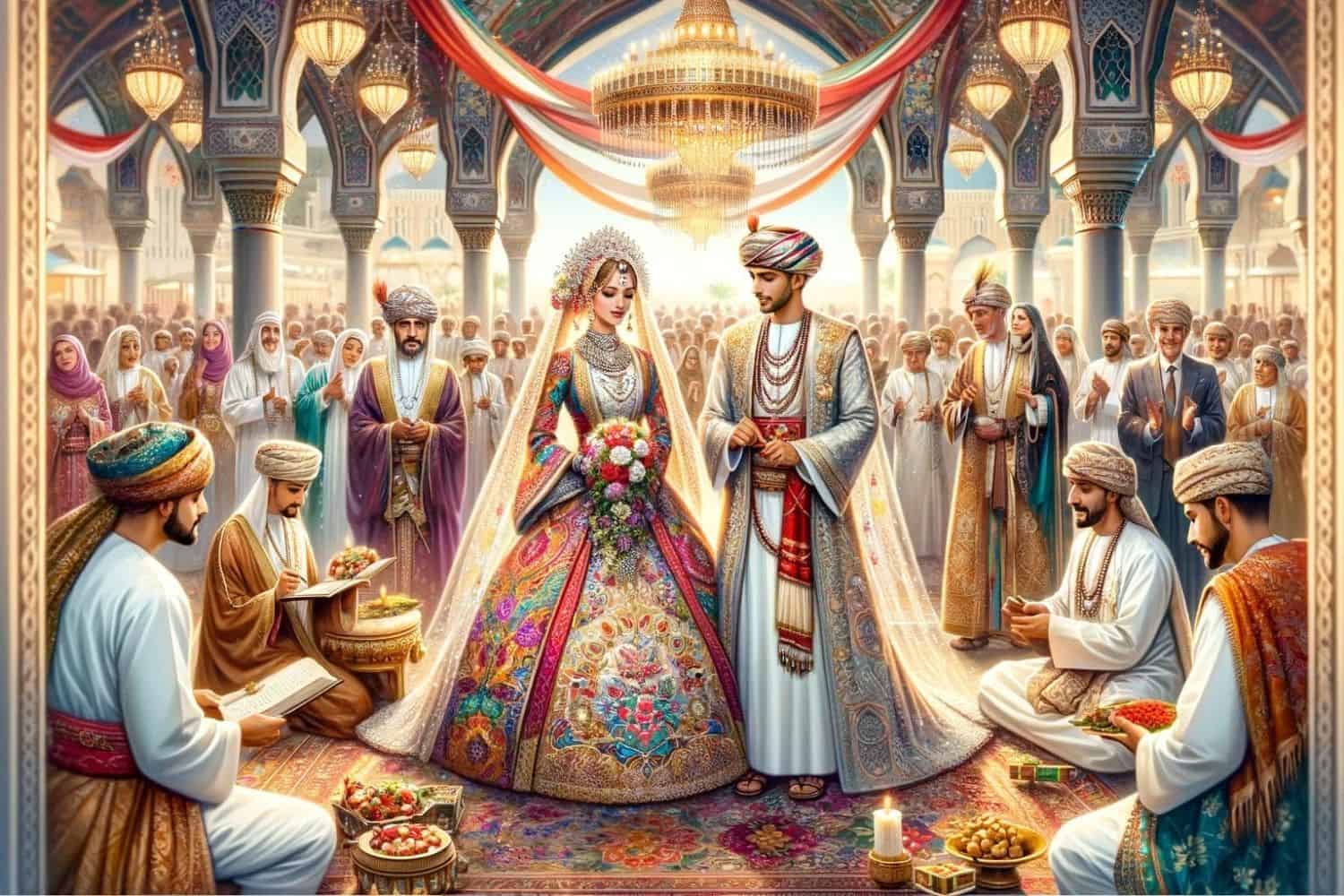
1. Matchmaking: While arranged marriages were common in the past, there is a growing trend in Oman toward love marriages, where individuals have more say in choosing their partners. Matchmakers, if used, consider factors like compatibility, family background, and religious values when suggesting potential matches.
2. Engagement: The engagement process typically involves a formal agreement between the families of the bride and groom. During this period, families exchange gifts and set the groundwork for the upcoming wedding.
3. Wedding Celebrations: Omani weddings are elaborate affairs that can last for several days. They include various ceremonies, feasts, music, and dancing. The main wedding ceremony, known as the “Zifaf,” involves the signing of the marriage contract and is often held in a grand venue or a mosque.
4. Bride’s Dowry: In Oman, it is customary for the groom to provide a dowry to the bride as a sign of commitment and financial security. This dowry can include cash, jewelry, and other valuable items.
5. Bridal Attire: Omani brides typically wear exquisite dresses, often in vibrant colors, accompanied by ornate jewelry and traditional headpieces. The bridal attire may vary based on the region and the family’s preferences.
6. Post-Wedding Customs: After the wedding, various customs may continue, such as the “Waleemah,” a celebratory feast hosted by the groom’s family, and other gatherings with family and friends.
7. Religious Significance: Marriage in Oman is not only a social commitment but also a religious one, with strong ties to Islamic customs and traditions. The marriage contract is conducted according to Islamic principles and may include recitations from the Quran.
8. Family and Community Involvement: Omani weddings are a communal celebration, with extended families and friends playing important roles in the festivities. Community support and involvement are highly valued.
9. Modern Influences: While traditional wedding customs remain prevalent, modernization and global influences have led to some changes in wedding practices. These changes may include the use of modern venues, music, and catering services.
Oman marriage traditions reflect the significance of family, community, and cultural identity in Omani society. Whether following traditional customs or embracing modern influences, Omani weddings continue to be a meaningful celebration of love and commitment, preserving the country’s rich cultural heritage.
Oman Food Culture
Oman food culture is a unique blend of flavors influenced by the country’s historical trade routes, geographical location, and cultural diversity. It incorporates a rich mix of Arabian, Persian, Indian, and East African culinary traditions.
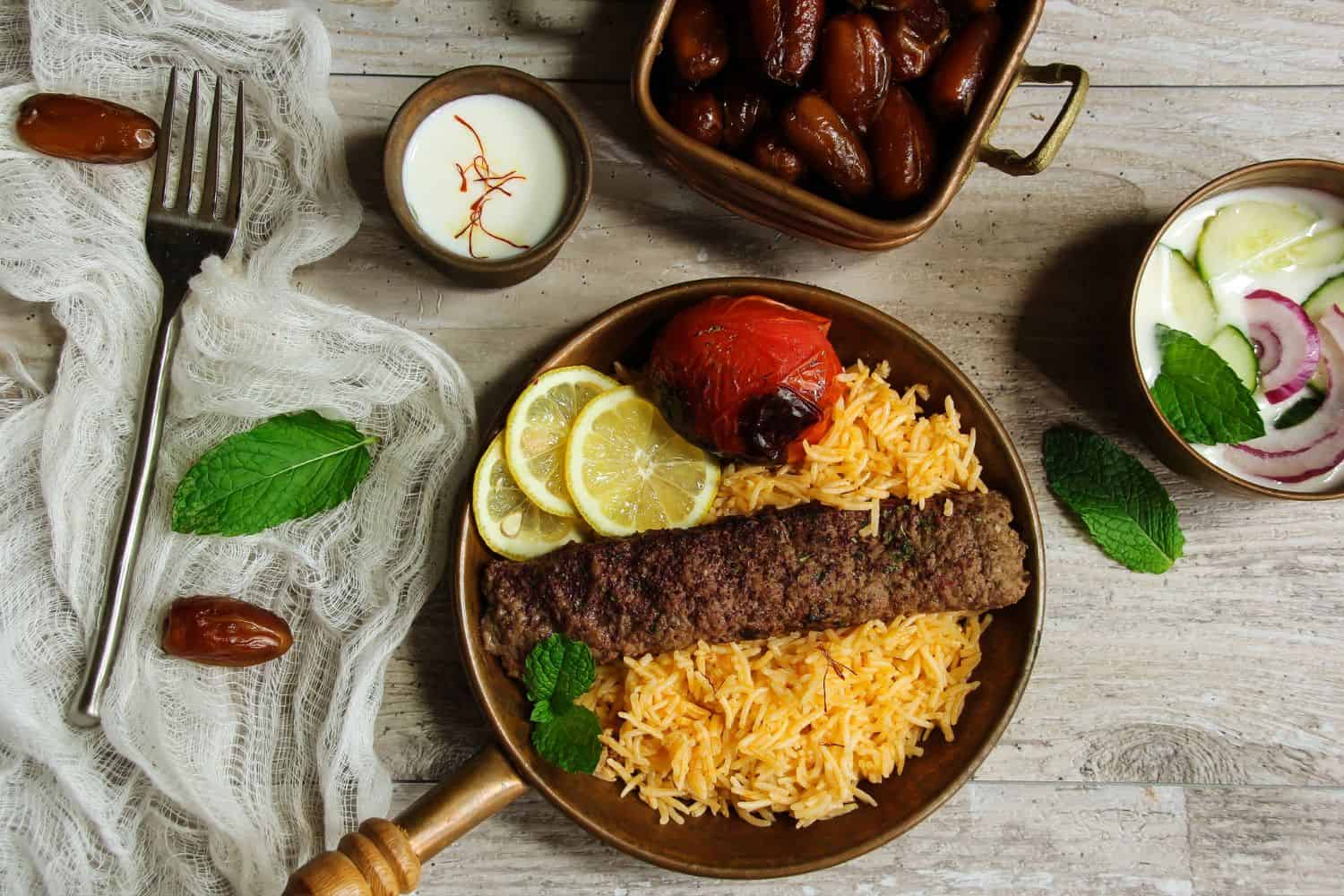
- Regional Variation: Food from Oman diverse geography, including coastal areas, mountains, and deserts, has fostered a variety of regional cuisines. Each region integrates local ingredients and traditional cooking techniques, contributing to a rich tapestry of flavors unique to each locality.
- Staple Foods: Omani cuisine relies on staple foods like rice, wheat, and barley. “Shuwa,” a traditional slow-cooked lamb dish, is a well-known specialty.
- Seafood: Due to its extensive coastline, seafood is a prominent feature of Omani cuisine. Fish, shrimp, and lobster are often marinated with spices and cooked to perfection.
- Spices and Flavorings: Omani dishes are flavored with a variety of spices such as saffron, cardamom, cumin, and black lime. Spices are used to enhance the aroma and taste of dishes.
- Traditional Dishes: Traditional Omani dishes include “mandi” (spiced rice with meat), “harees” (porridge), and “madrouba” (meat and rice cooked together). These dishes often reflect the influence of Persian and Arabian cuisine.
- Dates and Halwa: Dates are a symbol of hospitality in Oman and are often served to guests. Omani halwa, a sweet confection made from ingredients like rosewater, saffron, and nuts, is a popular dessert.
- Breads: Bread is a significant part of Omani meals. “Rukhal” and “khubz” are types of flatbreads commonly enjoyed.
- Coffee and Tea: Omani coffee, known as “kahwa,” is often flavored with cardamom and served as a welcoming gesture. Tea, especially black tea, is also widely consumed.
- Fruit and Dairy: Fresh fruits, such as pomegranates, figs, and citrus fruits, are commonly eaten. Dairy products like yogurt and buttermilk play a role in Omani cuisine.
- Communal Dining: Oman culture values communal dining, and meals are often shared with family and friends. Diners sit on the floor around a “sofra” (a low table) to enjoy their food together.
- Influence of Omani Heritage: The preservation of Oman food culture is a testament to the country’s rich heritage and historical trade routes. It reflects the enduring connection between Omanis and their culinary traditions.
Book our services
These guiding services ensure that your journey is not only enjoyable but also informative and hassle-free. Oman’s cultural delights, historical marvels, and natural wonders await your exploration with RJ Travel LLC. Our Oman Private Tours are designed to immerse you in the rich cultural heritage, historical significance, and breathtaking landscapes of this extraordinary nation.
Contact Us and our team will make sure to help you plan your trip to Oman when it’s safe and ready for travel. Whether you’re interested in joining a pre-arranged Oman small group tour or creating a custom itinerary, we are here to make your Omani adventure an unforgettable reality
More About Oman
[the-post-grid id=”50404″ title=”Oman Main page”]
Book Your Trip to Oman Today!
Embark on an unforgettable journey and explore the allure of Oman through our exclusive tours.

